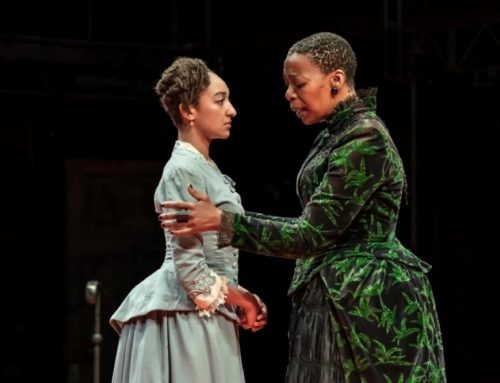Jackie Sibblies Drury’s polemic is a thought-provoking take on black women’s lives – just don’t expect a biography of Mary Seacole.
7 May 2022
Walking home from Marys Seacole, the question ‘what makes a good piece of theatre?’ popped into my mind.
I suppose one characterisation of a theatrical success night be that it promotes reflection on just this type of grandiose question. So, in one sense Writer Jackie Sibblies Drury has an accomplishment on her hands with Marys Seacole, because she certainly got me thinking. Indeed, the Donmar’s production, directed by Nadia Latif, is as strident and provocative a piece of political polemic as you will see this spring.
But is it actually any good as a play? I am not convinced.
As an historical figure, Mary Seacole is a worthy subject for a biographical drama. Born two centuries ago as the ‘free’ daughter of a Jamaican mother and white Scots father, she was raised by a white patron and spent a lifetime as a hotel-owner, healer, and nurse, providing care for the sick and injured in the Caribbean, Central America, London, and most famously in the Crimean War.
By the time of her death, Seacole had become a heroine every bit as well known to the Victorian public as Florence Nightingale.
This potted history, however, is pretty much all you learn about Mary’s life in this play, and any inkling as what kind of character she might have been remains maddeningly out of reach. That is because Drury has chosen to make this a story – part-comedy and part-drama – about black women as a whole. More specifically it is about the outsize contribution of generations of black women to the caring professions, hence the use of the plural ‘Marys’ in the title.
Thus, we see ‘Mary’, accompanied by a sidekick Mamie (powerfully played by Déja Bowens as a kind of long-suffering and put-upon Samwise Gamgee to Mary’s Frodo Baggins) simultaneously as an historical figure, a modern-day NHS nurse, and an American nanny.
In the background of these various time travelling incarnations of ‘Mary’, stands the embittered and angry presence of Mary’s mother, calling Seacole out on her enduring folly in seeking self-actualisation in a white-dominated world.
If there is a narrative line that ties all three presentations of Mary together, I suppose it is partly about the enduring cultural power of black women as sources of love and care, and how this has been abused by whites who hold power and who literally suck the love out of them. Partly also I suppose it is a demand, in the form of the mother’s presence, for the ‘Marys’ as a whole to stay true to their social heritage. The Kiln’s recent (and better) ‘Black Love’ explores similar topics.
The problem here is not the political discourse, delivered much of the time in Jamaican patois and often uncomfortable for middle class white audience members to hear. What is lacking is the emergence of either one of the Marys as fully formed characters. The mobile phone game-addicted American nanny ‘Mary’, shares with the bullying NHS nurse ‘Mary’ and the spirited Crimean war ‘Mary’, a nature that is a best an archetypal and at worse stereotypical.
The only Mary who seems to have any agency in this story is historical Mary. Yet in the final scenes of the play, even this Mary’s agency comes close to being stripped from the character through a near breakdown as she strives to reconcile what she has become with the demands of her ethereal mother.
Kayla Meikle is always watchable as the various incarnations of Mary, and it is a testament to her skill as an actor that she makes sense out of what is an often a confusing (and sometimes a baffling) narrative.
Pushing a provocative message as a way of being heard is as much the prerogative of a writer as a journalist or politico, and Marys Seacole is worth seeing for that reason alone. But as drama, it needs work.
Writer Jackie Sibblies Drury
Director Nadia Latif
Designer Tom Scutt
Déja J Bowens Mamie
Llewella Gideon Duppy Mary
Kayla Meikle Mary
Esther Smith Miriam
Olivia Williams May
Susan Wooldridge Merry
Full Disclosure: I paid full box-office price for the ticket.



